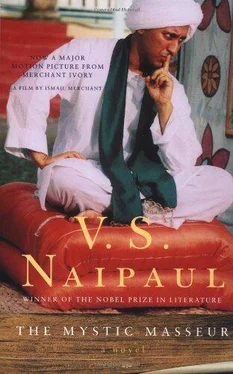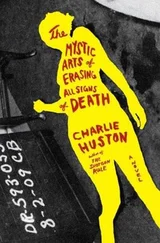Beharry did his best to hide his bewilderment.
Leela said, ‘It are beat me, if I see why for you doing all this.’
He left her to her worries; ordered her to get tablecloths, lots of knives, forks, and spoons; and warned her to look after the restaurant properly. He told Beharry it would be wise for him to lay in large stocks of rum and lager.
Presently the American soldiers began to pour into Fuente Grove and the village children had their first chew of gum. The soldiers came in jeeps and army lorries, some in taxis with girl-friends. They saw elephants in stone and were reassured, if not satisfied, but when Ganesh took them on a tour of his temple — he used the word ‘tour’ — they felt they had their money’s worth.
Leela counted more than five thousand Americans.
Beharry had never been so busy in all his life.
‘Is like what I did think,’ Ganesh said. ‘Trinidad is a small place and it ain’t have much for the poor Americans to do.’
Many of them asked for spiritual advice and all who asked received it.
‘Sometimes,’ Ganesh said, ‘I does feel that these Americans is the most religious people in the world. Even more than Hindus.’
‘Hollywood Hindus,’ muttered Beharry, but he nibbled so badly Ganesh didn’t catch what he was saying.
After three months The Hindu announced that it had to cut the number of its pages because it wished to help the war effort. Not many people besides Ganesh noticed that there were fewer advertisements for patent medicines and other internationally known products. The Hindu lost the glamour of illustrated advertisements; and Narayan was making money only from plain statements about small shops here and there in Trinidad.
But The Little Bird still twittered.
GANESH FOUND HIMSELF now a philosopher and arbiter. Indian villages in Trinidad still had panchayats , councils of elders, and he was often invited by them to give judgement in a case of minor theft or assault, or to settle a quarrel between husband and wife. Often, too, he was asked to address prayer-meetings.
His arrival at such a meeting was impressive. He came out of his taxi with dignity, tossed his green scarf over his shoulder, and shook hands with the officiating pundit. Then two more taxis came up with his books. Helpers fell upon these taxis, grabbed armfuls of books, and took them to the platform. The helpers were proud and busy people then, and looked almost as solemn as Ganesh. They ran from taxi to platform and back again, frowning, never saying a word.
Seated on the platform under a tasselled red canopy, and surrounded by his books, Ganesh looked the picture of authority and piety. His gaily-dressed audience rippled out from the platform in widening circles of diminishing splendour, from well-dressed businessmen and shopkeepers just below the platform to ragged labourers at the back, from extravagantly bedecked children sleeping on blankets and cushions to naked, spidery-limbed children sprawling on sugar-sacks.
People came to hear him not only because of his reputation but also because of the novelty of what he said. He spoke about the good life, about happiness and how to get it. He borrowed from Buddhism and other religions and didn’t hesitate to say so. Whenever he wished to strengthen a point he snapped his fingers and a helper held a book open towards the audience so that they could see that Ganesh wasn’t making it all up. He spoke in Hindi but the books he showed in this way were in English, and people were awed by this display of learning.
His main point was that desire was a source of misery and therefore desire ought to be suppressed. Occasionally he went off at a tangent to discuss whether the desire to suppress desire wasn’t itself a desire; but usually he tried to be as practical as possible. He spoke with fervour about the Buddha’s Fire Sermon. Sometimes from that he moved on naturally to the war, and war in general, and to the quotation from Dickens’s Child’s History of England that ‘war is a dreadful thing’. At other times he said that happiness was only possible if you cleared your mind of desire and looked upon yourself as part of Life, just a tiny link in the vast chain of Creation. ‘Lie down on the dry grass and feel Life growing out from the rocks and earth beneath you, through you, and upwards. Look at the clouds and sky when it isn’t hot and feel that you are part of all that. Feel that everything else is an extension of you. Therefore you, who are all this, can never die.’
People sometimes understood and when they got up they felt a little nobler.
And it was precisely for this that now, in 1944, The Little Bird began attacking Ganesh. It seemed to have reconciled itself to his ‘so-called mysticism’.
The Little Bird said: ‘I am just a little birdie but I think it is surely a retrograde step for any community these days to look up to a religious visionary …’
The Great Belcher told Ganesh, ‘And, boy, Narayan start copying you. He start giving lectures now — in the towns. And he showing his own books and thing too. Something about religion and the people.’
‘Opium,’ Beharry said.
Every new revelation of The Little Bird was carefully studied in Fuente Grove.
‘It ain’t your mystical powers he jealousing now, pundit. He working for the elections in two years’ time. First election with universal adult franchise. Yes, universal adult franchise. Is what he have his eye on.’
Later issues of The Hindu seemed to show that Beharry was right. Spare inches of the magazine were no longer filled up with quotations from the Gita or the Upanishads . Now it was all: Workers’ Unite! Each One Teach One, Mens Sana in Corpore Sano, Per Ardua ad Astra , The Hindu is an Organ of Progress, I may not agree with what you say but I will fight to the death to defend your right to say it . The Little Bird began to agitate for A Fair Day’s Pay for a Fair Day’s Work, and Homes for the Destitute; later it announced the opening of The Hindu ‘Homes for Destitutes’ fund.
One day Leela said to Suruj Mooma, ‘I are thinking of taking up social welfare work.’
‘My dear, is the said selfsame thing that Suruj Poopa begging me to do a long long time now. But, my dear, I ain’t have the time.’
The Great Belcher was enthusiastic and practical. ‘Leela, it have nine years I know you, and is the best idea you ever have. All this food I does come here and see you throwing away, you could give to poor people.’
‘Ah, Aunt, it are not much that I does throw away. If something are not use today, well it are use tomorrow. But how I could start up with this social welfare work?’
‘I go tell you how they does do it. You just get some children together, bring them inside the restaurant, and feed them up. Or you go outside, look for children, and feed them outside. Christmas-time come round now, you pick up two three balloons and you go round giving them away.’
‘Yes, Soomintra beginning to stock a lot of prutty prutty balloons.’
And every Sunday now Leela, with the help of The Great Belcher, did social work.
Ganesh worked on, unperturbed by Narayan and The Little Bird. It was as if Narayan’s taunts had encouraged him to do just the thing for which he was attacked. In this he was far-sighted; for certainly it was the books he wrote at this time which helped to establish his reputation, not only in the country, but also in Port of Spain. He used the material of his talks for The Road to Happiness. After that came Re-incarnation, The Soul as I See It, The Necessity for Faith. These books sold regularly and well; but none of them had spectacular success.
Читать дальше












